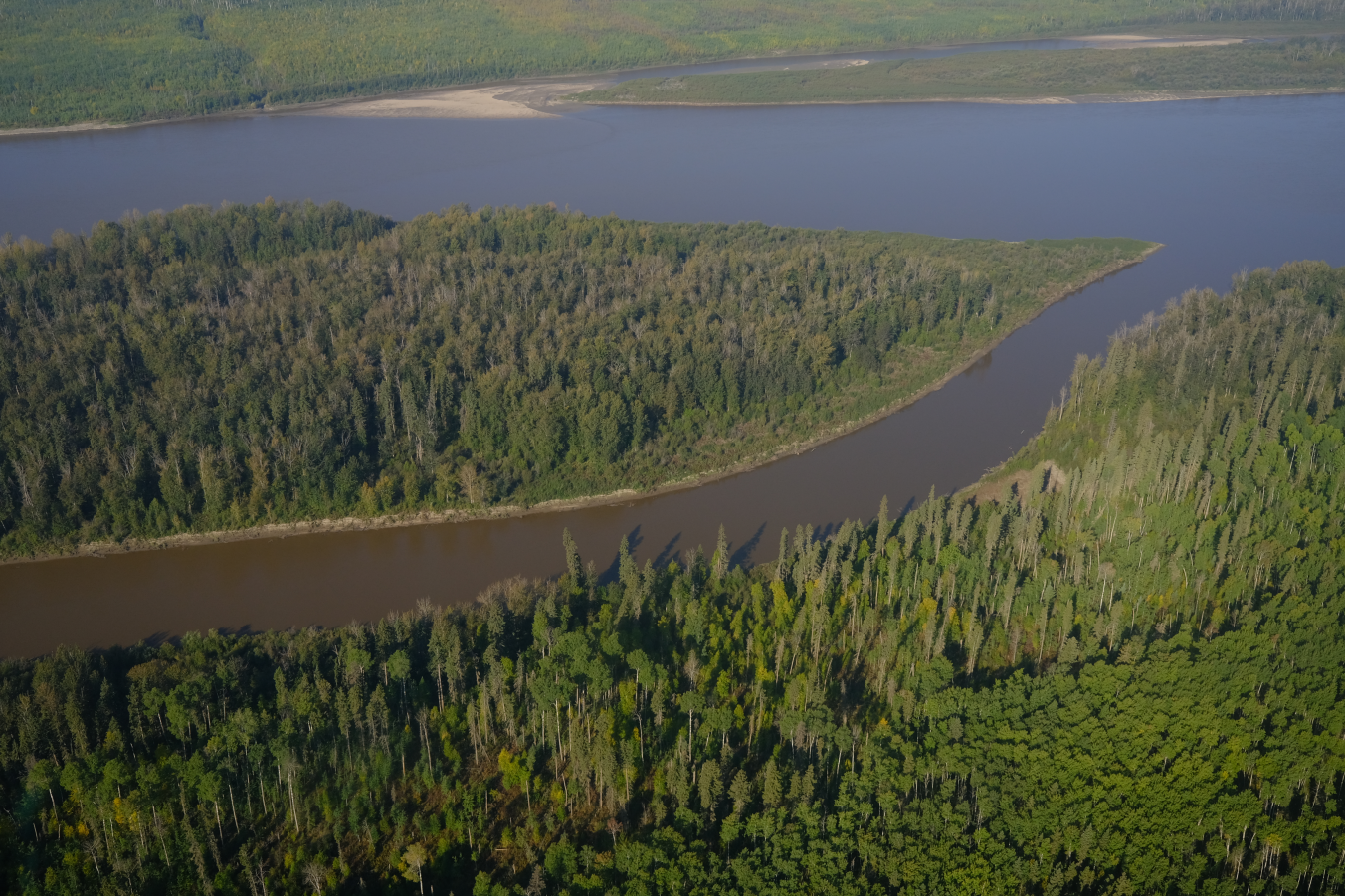
News Release: Athabasca River Basin seeks recognition of legal personhood in voicing concerns about the CNUL Jackpine oil sands mine
March 13, 2024
- •
- •
- •

The Athabasca River Basin (pictured) is requesting that the Alberta Energy Regulator recognize the Basin as a legal person. Photo © Phillip Meintzer.
March 13, 2024
CALGARY/TERRITORIES OF THE BLACKFOOT AND PEOPLES OF TREATY 7, HOME TO MÉTIS NATION OF ALBERTA, REGION III)
Last week, the Athabasca River Basin submitted a statement of concern to the Alberta Energy Regulator requesting that the regulator recognize the Basin as a legal person and accept its concerns about an application by Canadian Natural Upgrading Ltd (CNUL).
The statement was prepared on behalf of the Basin by Keepers of the Water, Alberta Wilderness Association, and Ecojustice. These organizations have advocated for the protection of the land, waters, and communities in the Athabasca oil sands region for decades.
CNUL’s application seeks to renew its permits under Alberta’s Environmental Protection and Enhancement Act and the Water Act, which are set to expire on May 31, 2024. CNUL needs these permits to operate the Jackpine Mine, an open-pit oil sands mine 70 km north of Fort McMurray. The Mine is located on the east side of the Athabasca River and it withdraws (on average) almost 50 million litres of water from the watershed each day. The renewal would allow the Mine to continue operating for another 10 years.
The Athabasca River Basin’s statement asks the regulator to recognize the Basin as a “directly and adversely affected person,” which would grant the Basin legal standing to raise concerns about any substantive issues in CNUL’s application.
The Basin’s statement argues that CNUL’s application fails to provide specific information that is required by the regulator. The application is missing key information about air quality, water quality and flows, climate change, and the impacts of contaminants emitted from the Mine into the air and waterways. There are discrepancies and gaps about how much water the Mine uses, and there is no cumulative effects assessment about impacts to regional water quantity.
Without this information, the regulator is not able to conduct an accurate and rigorous assessment of the impacts of the Jackpine Mine to the Athabasca River Basin over the next 10 years and set conditions on CNUL that would better protect the Basin and the people that depend on it. Leaving these gaps unaddressed risks exacerbating the impacts of the extreme drought currently affecting Alberta.
The regulator has the authority to recognize the Athabasca River Basin as a legal person. It also aligns with Indigenous worldviews and follows precedent in Canada and around the world. For example, in 2021, the Innu Council of Ekuanitshit and the Minganie Regional County Municipality recognized the Magpie River in Quebec as a legal person. New Zealand, the USA, Spain, and Ecuador have also recognized rivers in their countries as legal persons.
Phillip Meintzer, Conservation Specialist with Alberta Wilderness Association said:
“The Athabasca River Basin is being hammered by the cumulative impacts of industrial development across the length of its watershed, particularly by the oil sands industry. Without legal personhood, it’s very difficult for these crucial ecosystems to push back against further harm.”
Jesse Cardinal, Executive Director for Keepers of the Water said:
“Collectively, as the society we live in, we need to be balanced in our relationship with land and water. Acknowledging and honoring the life-giving force of the Athabasca River Basin can only create win-win scenarios for everyone. Water is alive and should be treated as such; if we grant corporations with legal personhood, we should certainly be recognizing – and protecting – an ecosystem as important as the Athabasca River Basin.”
Matt Hulse, lawyer, Ecojustice said:
“The process of renewing CNUL’s permits under EPEA and the Water Act gives the regulator an important opportunity to assess the current and projected impacts of the Jackpine Mine on the environment and human health. It is critical that the regulator has the information it needs to do this assessment properly. The fact that the Athabasca River Basin is bringing issues with CNUL’s application to the regulator’s attention as a legal person may be new in Alberta, but it is consistent with the evolution of law in Canada and around the world.”
About
Alberta Wildness Association is the oldest Alberta-based environmental conservation group with more than 7,500 members and supporters in Alberta and around the world. AWA seeks the completion of a protected areas network and good stewardship of Alberta’s public lands, waters, and biodiversity to ensure future generations enjoy the abundant benefits they provide.
Keepers of the Water are First Nations, Métis, Inuit, environmental groups, concerned citizens, and communities working together for the protection of water, air, land, and all living things within the Arctic Ocean Drainage Basin.
Ecojustice uses the power of the law to defend nature, combat climate change, and fight for a healthy environment. Its strategic, public interest lawsuits and advocacy lead to precedent-setting court decisions and law and policy that deliver lasting solutions to Canada’s most urgent environmental problems. As Canada’s largest environmental law charity, Ecojustice operates offices in Vancouver, Calgary, Toronto, Ottawa, and Halifax.
For media inquiries
Phillip Meintzer, Conservation Specialist |Alberta Wilderness Association
pmeintzer@abwild.ca (403) 771-1647
Jesse Cardinal, Executive Director | Keepers of the Water
ed@keepersofthewater.ca
Shayo Mehta, Communications Strategist | Ecojustice
smehta@ecojustice.ca (604) 685-5618 ext. 249
Link to PDF version of this news release:
